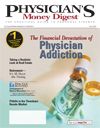Publication
Article
Physician's Money Digest
E-mail Fraud Still Perking Along
If you get e-mail, then most likely you've received an unsolicited message claiming to be from a Nigerian official who needs your financial help to get large sums of money out of that country. Known officially as the "Nigerian 419" scam (after the section of the Nigerian criminal code that addresses Internet fraud), thousands of people over the past 10 years have collectively lost many millions of dollars to 419-type scams.
Interestingly, 419 scams trap people from all walks of life and all degrees of financial savvy. Apparently, greed or a penchant for risk taking can inhibit the brain's circuits for rational thought.
The FBI warns everyone not to reply to any e-mail from Nigeria asking for personal or banking information and/or to place large sums of money in overseas bank accounts. Also, anyone you know who is contemplating or involved in such a transaction should be encouraged to contact the FBI or Secret Service immediately. For more information, visit the University of Pennsylvania's 419-Scam information page: www.upenn.edu/com puting/security/advisories/419scam.html.
